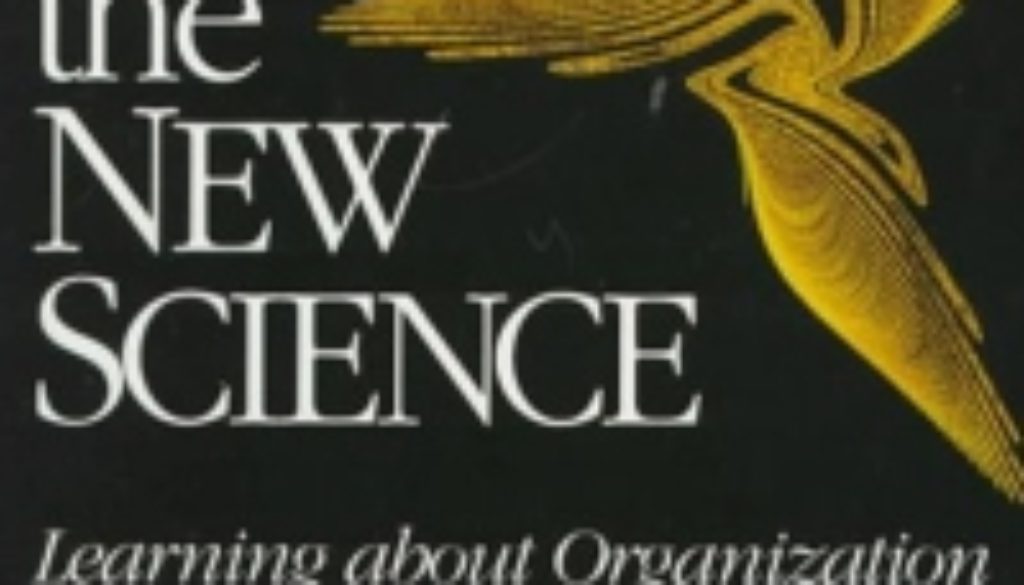Book Review: Leadership and the New Science

The following was written for the University of San Francisco Business Journal in 1995.
By John D. Breen – San Francisco, CA
September 13, 1995
In Leadership and the New Science, Margaret Wheatley has forwarded concepts that are superficially radical. Resistance to her notion of “de-engineering” and progress through disorder is reminiscent (on a slightly diminished scale) of the reaction many world leaders and scientists had to Einstein’s Theory of Relativity. That theory, confirmed in May 1919, unleashed a palpable wave of uncertainty and trepidation. Principles and convictions that had been irrefutable for centuries were suddenly cast into doubt.
Predictably, people with longstanding convictions are uncomfortable with the prospect of a dramatic shift in their worldview. The new science and other challenges to the structural outlook of the latter half of the 20th Century have evoked comparable anxieties. These fears notwithstanding, my reaction to The New Science is that although the ideas embodied therein are radical by the standard of modern times, the underlying premise is not entirely novel.
A concept intermittently prominent since the time of Aristotle, and of which I consider myself a proponent, is that of Natural Law. The Natural Law philosophy as depicted by such as Aquinas, Montesquieu, and Locke approached its apex in the latter half of the 18th century, and its culmination in the founding documents of the United States.
Natural Law theory maintains that there exists an underlying natural order ordained by God, and that that positive laws of man cannot circumvent. Foremost among these distortions are laws which infringe upon the unalienable (i.e., natural) right of individuals to enjoy the fruits of the labor, creativity, and effort. Policies that attempt to do so are “null, void, and of no effect.”
Margaret Wheatley is not, in my opinion, a proponent of Natural Law philosophy. The assertion that “the environment remains uncreated until we interact with it” contradicts a primary tenet of the concept. Nevertheless, more than a few of her hypotheses are the progeny of Natural Law. By repeating the claim that “the more freedom in self-organization, the more order”, Wheatley acknowledges the ideas of liberty implicit in Natural Law theory. Furthermore, she declares that “self-organizing structures…show how a large system is able to maintain its overall form and identity only because it tolerates great degrees of individual freedom.” I could not agree more.
Most Americans, myself included, believe that freedom is a prerequisite for prosperity. Unfortunately, we seldom allow our reverence for the theory to interfere with our aversion to the practice. Our fear of the implications of liberty are overwhelming. In most of our prominent organizations, from the exorbitant general government of the United States to many Fortune 500 companies, suspicion and control are too often the norm rather than the exception. By subjugating the freedom of the individual to the dictates of the organization, these institutions are engaging in a vain attempt to defy both Natural Law and the and the “participative nature of the universe.”
I am by no means in complete agreement with the theme of The New Science. Wheatley sometimes seems to confuse relativity with relativism, a propensity that Einstein himself anticipated and lamented. Although an abundance of information and a multiplicity of perspectives are essential to productivity and growth, human endeavors must be undertaken within the bounds of an objective standard of truth. This standard is prescribed by “the Laws of Nature and of Nature’s God”, and is contravened by individuals and organizations at their peril.
Margaret Wheatley’s application of “new science” to modern organizations is insightful and thought-provoking. My initial response to the premise of the book was to disregard it as yet another example of new-age psychology. However, upon further reading and reflection, I noticed that while I did not agree with all her assertions, I considered them worthy of further contemplation. I am heartened to know that while I initially rejected out-of-hand the premise of The New Science, I eventually came to recognize its value. That I should strive to do this more often is perhaps the primary message of this book.
JD



